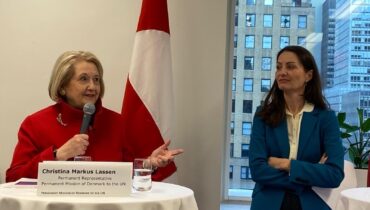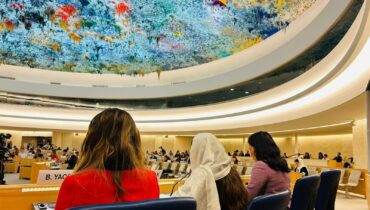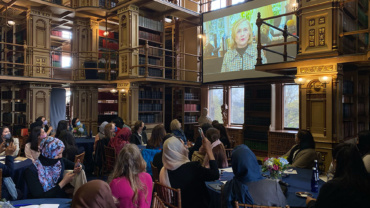
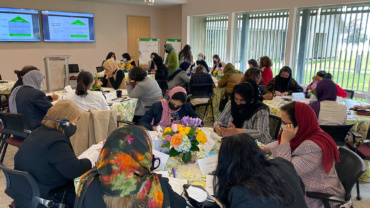
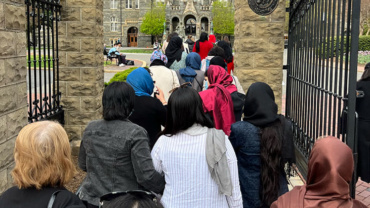
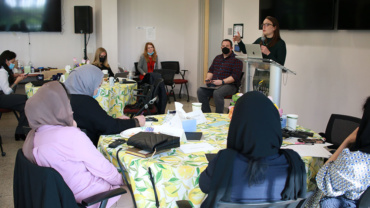
“We are not alone here,” one of the exiled leaders declared early in the retreat.
In all, 27 leaders from the Onward for Afghan Women network gathered for the retreat.
Over the first two days, participants attended tailored workshops in English and Dari that aimed to foster resilience and recovery after their harrowing evacuation experience, as well as provide opportunities to connect with fellow Afghan women leaders.
“After eight months away from my country, the last three days were the best days of my life,” Zahra Yagana, who attended the retreat, reflected. “After a long time, I did not feel alienated, and I met a group of my Afghan sisters again and met the American sisters.”
The Onward network includes human rights activists, journalists, academics, and former government officials who are determined to advocate for the rights of Afghan women and girls.
“Our Onward members had distinguished careers, fighting to create a just, equal, and inclusive Afghanistan. They’re extremely passionate about continuing this work,” Smith said. “We offered these training sessions to assist them in being effective advocates equipped to influence U.S. policymakers.”
In addition to personal development sessions, specialized workshops focused on advocacy strategy and media engagement helped participants to better understand America’s political environment. “I feel grateful for having this community around me here, for helping me to recover from the trauma that I experienced,” one participant shared during the retreat. “Having a community to share, talk, ask for support, and for help to continue my work…[it is] very important.”
“We wanted the retreat to serve as both an oasis for these incredible women, as well as provide sessions that would help propel them forward as the leaders they are,” said Alicia Burke, a Bank of America executive and one of the retreat organizers. “Our goal was to lift them up, but the reality is that by sharing their stories, determination, and talents — they lift us up and propel us all forward.”
In the months leading up to the retreat, GIWPS offered an array of virtual workshops and programming to support the Afghan leaders. Lina Tori Jan, GIWPS program coordinator, held weekly community chats and organized virtual conversations with experts in legal and immigration services; chronic stress, loss, and trauma; self-care; and employment services.
“These dialogues and workshops created space and time for Afghan women to connect, celebrate, and support each other,” said Tori Jan. “When you imagine what successful resettlement looks like, physical safety and economic security usually jump to mind. But cultivating a sense of community in a new, unfamiliar environment is just as important.”
CREATING A SPACE FOR ADVOCACY
Making the most of their time in Washington, GIWPS used the last day of the retreat to connect Afghan leaders with U.S. policymakers.
Gathering in Georgetown University’s historic Riggs Library, participants met with leaders from the State Department, White House, and NGOs who directly supported their evacuation and resettlement in August 2021. The reunion was made more special by a surprise recorded message from former secretary of state Hillary Clinton.
“During the evacuations last summer, when every moment it was unclear what the future held, what kept me going was this powerful coalition of women helping women,” Clinton told the audience. “You embody one of my deepest held beliefs: that women are the cornerstones of global peace and security. I want to tell you from the bottom of my heart that not only your country but the world needs your leadership, your courage, and your commitment.”
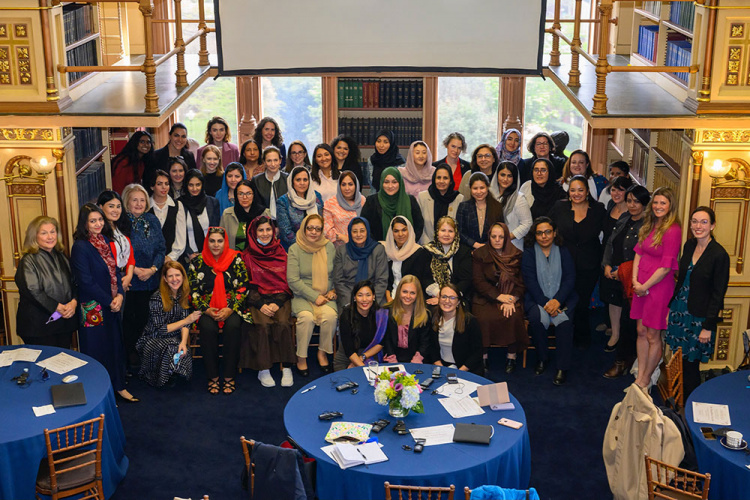
GIWPS also invited U.S. Special Representative for Afghanistan Thomas West and U.S. Special Envoy for Afghan Women, Girls, and Human Rights Rina Amiri to meet with the Afghan leaders. During an hour-long conversation, they offered insights and exchanged ideas about paths forward in U.S. policy that would ensure equal access to education, humanitarian aid, and economic recovery for all Afghans—especially women, girls, and ethnic minorities.
“It was an intense and really instructive dialogue,” said Smith. “The diversity of expertise these women offer can make a real impact on U.S. policy toward Afghanistan. The team at State followed up afterward to express an interest in continuing the conversation, so hopefully this meeting was just the start.”
IMPROVING THE RESETTLEMENT PROCESS
While many members of the Onward network have resettled successfully in the U.S., immigration challenges—including delays in converting the Special Immigrant Visa (SIV) to a permanent residency—persist. Moreover, most Afghan leaders have left behind family members, friends, and colleagues who are still attempting to leave Afghanistan with support from their resettled kin.
To address these challenges, GIWPS organized a panel discussion with State Department officials who are spearheading the Department’s efforts to relocate Afghans and their families. Led by the Coordinator for Afghan Relocation Efforts (CARE) Ambassador Beth Jones, the CARE team tackles issues such as family reunification and refugee processing in third countries.
“Many Afghan experts in the room had worked with refugee populations before,” said Smith. “Then, they had the lived experience of becoming refugees themselves, going through the camps and military bases, and finally resettling here. They are better equipped than anyone to identify challenges, gaps in what services are provided, what information is missing for new arrivals.”
